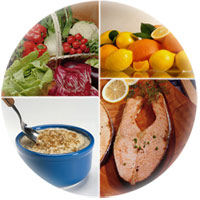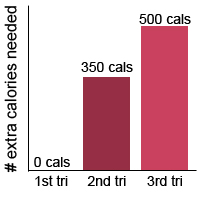Holistic Pregnancy & Childbirth

How Can I Best Prepare for Pregnancy and Childbirth?
 Ideally, preparation for a holistic pregnancy and childbirth begins before you become pregnant. Your own good health helps your baby's health. And when you and the baby are healthy, you have more choices in childbirth.
Ideally, preparation for a holistic pregnancy and childbirth begins before you become pregnant. Your own good health helps your baby's health. And when you and the baby are healthy, you have more choices in childbirth.
To begin, see your healthcare provider
One of the first things you should do is schedule a preconception counseling appointment with your current healthcare provider to discuss your pregnancy plans. This can help you identify your health strengths, as well as any family history or health problems that might affect pregnancy, such as diabetes, asthma, or high blood pressure. Your healthcare provider will be interested to learn about your work or hobbies to help you identify whether you are at risk for developing certain viruses or infections.
Try to work with your provider to get any chronic health conditions under as much control as possible before you become pregnant. (Note: these issues can also be discussed during your routine "annual" exam.)

You should consider your overall health and wellbeing, including diet, exercise, relationships, to name a few.
Work to maintain or achieve a normal weightfor your height.
(Click for a Body Mass Index chart that can help you determine if you are currently at, above, or below normal weight.)
 Nutrition is very important while you are trying to become pregnant. A balanced, healthy diet should include sources of protein (such as meat, cheese, dried beans), whole grains, vegetables and fruits, and sources of calcium (such as milk or other dairy products).
Nutrition is very important while you are trying to become pregnant. A balanced, healthy diet should include sources of protein (such as meat, cheese, dried beans), whole grains, vegetables and fruits, and sources of calcium (such as milk or other dairy products).
In general, fresh whole foods are preferable to highly processed foods, and you might want to consider organic foods when available, especially when choosing fresh fruits and vegetables. Commercially grown grapes, strawberries, cherries, peaches, apples, apricots, spinach, bell peppers, celery, green beans, cucumbers, and cantaloupe are among the foods most highly sprayed with pesticides and herbicides, so choosing organically grown alternatives is especially beneficial for these products.
Getting enough folic acid in your diet can prevent a neural tube defect. Folic acid can be found in green vegetables and whole grains, but because the amount needed to prevent birth defects is fairly high, you begin taking a vitamin supplement that contains 400 micrograms of folic acid.
The neural tube develops before many women realize that they are pregnant, so most doctors and midwives recommend that all women take a folic acid supplement even before they become pregnant. The March of Dimes has more information about folic acid and neural tube defects on its website.
Exercise. If you do not already have a re gular exercise routine, this is the time to start. Most individuals recognize the physical benefits of exercise, but might not realize that exercise also helps manage stress and promotes good mental health. You may consider a variety of exercise programs, depending on your interest, including walking, running, swimming, or biking. Group classes, such as yoga, Pilates, or aerobics, are also a good choice.
gular exercise routine, this is the time to start. Most individuals recognize the physical benefits of exercise, but might not realize that exercise also helps manage stress and promotes good mental health. You may consider a variety of exercise programs, depending on your interest, including walking, running, swimming, or biking. Group classes, such as yoga, Pilates, or aerobics, are also a good choice.
To be most effective in maintaining good health, you should exercise four to five times per week, for at least 30 minutes, but if you have not exercised before, you should build up to this level gradually. There are also specific exercises for pregnancy, including pelvic muscle exercises (sometimes called Kegel exercises), pelvic rocking, and squatting.
Most people know that there are harmful to a developing baby, but they should also be avoided when trying to become pregnant. These habits are hard to break, but having a baby is often very good motivation. If you think you might have difficulty, check with your insurance company to see if they sponsor or pay for programs to help you quit. While it is most beneficial to stop smoking altogether, there is benefit in reducing the total number of cigarettes you smoke.
Review any prescription or over-the-counter medications, supplements, or herbs that you take with a doctor, midwife, or pharmacist. Sometimes, it is necessary to continue taking medications, such as asthma medications, to protect your own health.
Sometimes, you can substitute safer medications during the pre-pregnancy and pregnancy periods. There are some medications, however, that should not be taken at all during pregnancy or while trying to become pregnant. If you take medications for a chronic health condition, tell your healthcare provider that you want to become pregnant, so that he or she can help you choose medications that are safest during pregnancy.
Avoid environmental toxins while you are trying to become pregnant. Cautions to take include: wearing gloves when gardening, avoiding raw meat products, having someone else change a cat litter box if you have one, and switching to the least toxic home cleaning products you can find.
These are discussed in more detail in the next section.
While the birth of a child is generally a happy, anticipated event, it is also stressful. You might worry about how you or your partner will care for a child, what kind of parents you will be, how your other children will react to the new baby, or if you can afford a child. You might recognize how the birth of a child means a loss of control over your body and your time.
All of these are stressful, and it is helpful to have frank discussions with your partner about what both of you think you will need from each other, from other family members, and from friends. If handling stress is difficult for you or if you have had a history of depression, this might be a good time to seek therapy with a goal of identifying ways to manage stress.
If you are planning to be a single parent, it is especially important to identify supportive family and friends.
Carrie, who is having her first baby, identified earlier in her pregnancy that she could count on her sister Tina, who has two children, for emotional support. Tina consistently assured Carrie that she would be a great mom and that she would be there to help.
- 1 of 10
- 2 of 10
- 3 of 10
- 4 of 10
- 5 of 10
- 6 of 10
- 7 of 10
- 8 of 10
- 9 of 10
- 10 of 10
What should I do if I am already pregnant?
Congratulations! You have embarked on a rewarding and growth-filled journey, but it will be accompanied by some hard work. Feelings of ambivalence or worry might accompany feelings of happiness. All are normal.
If you haven't already, please read the section above on preparing for pregnancy. The information about nutrition, exercise, medications, drugs and alcohol, and personal support are even more important now that you are pregnant.
Get a schedule of prenatal visits. Many people assume that prenatal care is what you get at your appointments with your midwife or physician, and certainly, this care is important. (See also a discussion of many of the tests offered during pregnancy.)
The most beneficial prenatal care will be the care that you give yourself and your baby everyday. Although the causes of a few pregnancy complications are unknown, and a few cannot be controlled, many complications can be avoided or minimized by taking good care of yourself. By staying low-risk and healthy, you maximize your options for childbirth.
Take care of yourself
Get the nutrients you need
Good nutrition is essential for a healthy pregnancy and for the growth of the baby.
Other than a folic acid supplement of 400 micrograms, most pregnant people can get their required nutrients from carefully chosen food and do not need to take vitamins. However, if you are anemic, your midwife or doctor may recommend an iron supplement. Some pregnant women do have a difficult time obtaining enough calcium, iron, protein, and green leafy vegetables.
Other important nutrients include essential fatty acids (especially Omega 3 fatty acids) and choline, both of which help the baby's developing brain and nervous system. If these nutrients are in short supply in your diet, you may wish to add a supplement. Click for sources of key nutrients. More resources about nutrition can be found under Additional Readings. You might need to make adjustments if you have significant nausea or vomiting in your pregnancy.
Exercise
Exercising and eating well can help keep your blood sugar in a normal range and can help you avoid having a very large baby. Exercise also helps you build strength and endurance, which are important for coping with labor.
Watch your weight gain
Weight gain is expected during pregnancy, but the amount of weight you gain is important.
 Check a BMI calculator and determine whether you are of normal weight or over or underweight. If you have started out your pregnancy at a normal weight, plan to gain between 25 and 35 pounds. If you are overweight, plan to gain about 15 pounds. If you were underweight, plan to gain between 28 and 40 pounds. The amount of extra food a pregnant person needs is not large. If you are of average weight and are moderately active, you need the same amount of calories in your first trimester as you did before you were pregnant. In your second trimester, you need 350 calories more a day; and in your third trimester, only 500 extra calories are needed per day. (Three hundred calories is the equivalent of three glasses of non-fat milk or a peanut butter sandwich.)
Check a BMI calculator and determine whether you are of normal weight or over or underweight. If you have started out your pregnancy at a normal weight, plan to gain between 25 and 35 pounds. If you are overweight, plan to gain about 15 pounds. If you were underweight, plan to gain between 28 and 40 pounds. The amount of extra food a pregnant person needs is not large. If you are of average weight and are moderately active, you need the same amount of calories in your first trimester as you did before you were pregnant. In your second trimester, you need 350 calories more a day; and in your third trimester, only 500 extra calories are needed per day. (Three hundred calories is the equivalent of three glasses of non-fat milk or a peanut butter sandwich.)
Deal with stress
It is also important to pay attention to your emotional health during pregnancy and find ways to deal with stress.
It is also important to pay attention to your emotional health during pregnancy. Stress is very common in our society; and, women often experience additional worry and fear during pregnancy.
You might find that you worry about the baby, becoming a parent, finances, the change in your family, or many other things. Our system of healthcare, which often focuses on problems, may add to these worries with the various screening tests offered in pregnancy.
It is a good idea to find a stress-reduction technique that you like and start practicing early in your pregnancy. Some good options include guided imagery, breathwork, meditation, or yoga with an instructor who is experienced in teaching pregnant individuals. See the Mind-Body Therapies topic for more information on these and other helpful therapies and practices.
Avoid toxins
You should avoid most environmental toxins during pregnancy.
Tips to avoid toxins
- Toxoplasmosis: Wear gloves when gardening, do not consume raw meat products, have someone else change a cat litter box if you have one, and wash your hands after playing with your cat.
- Lysteria: Avoid unpasteurized milk.
- Mercury: Avoid tuna and other large fish.
- Hot tubs/saunas: Excessive heat can affect the developing baby's central nervous system.
- Alcohol: No amount of alcohol is safe during pregnancy and can contribute to fetal alcohol syndrome.
- Tobacco: Tobacco use can affect the baby's growth and adversely affect your blood pressure. Even cutting back helps, if you are unable to stop completely.
- Most medications: Discuss any medications, supplements, and herbs that you take with your health care provider to discuss safe alternatives.
- Viruses: Regular handwashing is important for everyone, but especially important if you work with young children (to help prevent exposure to Fifth's disease, cytomegalovirus, chicken pox, and rubella).
- Home products: Switch to the least toxic products you can find. Wear gloves, keep the area well ventilated, and wash your hands when you are finished.
- The workplace: Some jobs present specific risks to the developing baby. For example, you might be exposed to lead or other chemicals. Discuss your work with your care provider to help identify any potential risks. You can also ask your employer for the Material Safety Data Sheet for any substances that you might be exposed to at work, and bring a copy of this to your care provider.
Two stories

Carrie
When Carrie discovered she was pregnant, she realized she needed to make some changes.
When Carrie discovered she was pregnant, she realized that she should probably make several changes to promote her health and her baby's health. She had been smoking a few cigarettes a week when out with friends and didn't have any difficulty stopping.
Her diet was more challenging. Carrie tried to change her diet "overnight," but often felt she had slipped back into old habits. One of her coworkers suggested that she was being too hard on herself, and she suggested that Carrie just make one change per week. Carrie tried this and had a much easier time. The first week, she increased her intake of high calcium foods. The second week, she started packing fresh vegetables to supplement her lunch and have as snacks. The third week, she started cutting back on soda and drinking more water. She found these gradual changes much easier to stick with.

Lorinda
Lorinda found herself very stressed with her move to the new town.
Lorinda found herself very stressed with her move to the new town. She was busy with the packing and unpacking, but once that was finished, fatigue set in, and she began to miss her family and friends. Her family had also helped babysit her older child when she and Marcus went out, and she missed their time alone together.
Marcus noted one evening that Lorinda seemed especially irritable, and, to both their surprise, Lorinda began to cry. Marcus was supportive, but unsure how to help her. Lorinda's new midwife suggested that Lorinda attend a weekly mother's group, and helped her find one close to her home. Lorinda found that being able to talk over her feelings with her midwife and other women helped her sort them out. Lorinda also asked Marcus to take their older child for a 30-minute walk each evening, and Lorinda used this time to meditate. The combination of these changes helped Lorinda cope more effectively with her stress.<
How can I make myself more comfortable?
Follow the suggestions above on eating a balanced healthy diet, avoiding excessive weight gain, and exercising. These will help you stay healthy and able to cope with the increased demands that pregnancy places on your body and immune system. It is also important to practice stress reduction techniques on a regular basis.
Here are some suggestions for specific discomforts:
- Nausea. Try to eat small, frequent meals. Small bites of crackers, hard candy, sips of juice or soda may help. Consider acupressure bands (wristbands) or acupuncture.
- Back pain. Pay careful attention to your posture when standing, sitting, driving, or working. Don't stand with your weight on one foot and avoid crossing your legs when sitting. Avoid lifting more than 20 to 25 pounds (including older children!), and be especially careful when lifting: bend your knees, hold the object close to your body, and use the muscles in your legs to assist you in lifting. If you spend a lot of time standing, consider standing with one foot up on a three- or four-inch block, with your weight evenly balanced on both legs. Cold packs or hot packs may provide some relief, as may spending some time in a knee-chest position. Consider yoga or prenatal exercise classes, acupuncture, massage, physical therapy, or chiropractic care. Not all providers are used to caring for those who are pregnant; be sure to ask about this when making appointments, and ask for referrals if needed.
- Fatigue. Prioritize activities. Consider brief periods of rest or a nap during the day (but don't make this too long or you might have difficulty sleeping at night). Ask for help from others. You might find that meditation or exercise is rejuvenating. Consider complementary therapies, such as Reiki.
- Hemorrhoids or constipation. Make sure you are getting 10 to 12 glasses of water or other non-caffeinated liquid each day. Warm water especially helps stimulate the bowels. Your diet should include fresh fruits and vegetables and whole grains. Daily exercise also helps. Witch hazel compresses may be soothing for hemorrhoids.
- Edema (swelling). Rest with legs elevated periodically during the day. Consider massage, especially leg and foot massage.

- Heartburn. Consider eating several small meals instead of three large ones. After eating, remain upright for about 45 minutes. You might identify some foods, such as foods high in fat, which make heartburn worse - pay attention to your body's message and avoid them!
- Mood swings. Make sure you are getting enough rest. Stress reduction practices, such as meditation or breathwork, might be helpful, as might complementary therapies, such as massage or Reiki. Of course, it is also helpful to talk about your concerns with your partner, another supportive friend or family member, or a mental health professional.
- Carpal tunnel. Carpal tunnel may cause tingling in your fingers or pain in your wrists and hands, and is caused by swelling tissue in your wrists putting pressure on the carpal nerve. You can do hand and finger massage yourself to increase blood flow to your hands and reduce the swelling. You can also elevate your arms above your head. Physical therapy and acupuncture have also been shown to be effective.
Additional Readings
Exercise:
Essential Exercises for the Childbearing Year, 4th ed. Elizabeth Noble. 2003.
Exercises to ease pregnancy aches and prepare you for childbirth. BabyCenter.
Nutrition:
Nutrition and Pegnancy: A Complete Guide from Preconception to Postdelivery. Judith E. Brown and Howard N. Jacobson. 1998.
Pregnancy Food Dos and Don'ts. U.S. Department of Health and Human Services.
Emotional Wellbeing:
The Woman's Comfort Book: A Self-Nurturing Guide for Restoring Balance in Your Life. Jennifer Louden. 2005.
Prenatal Care:




